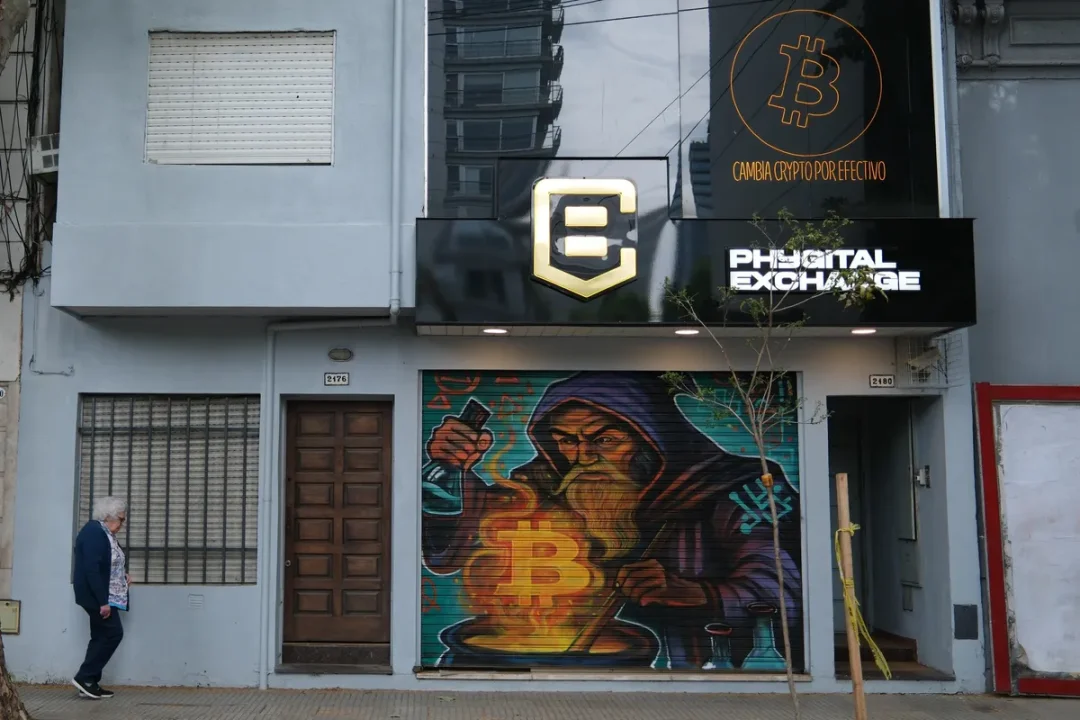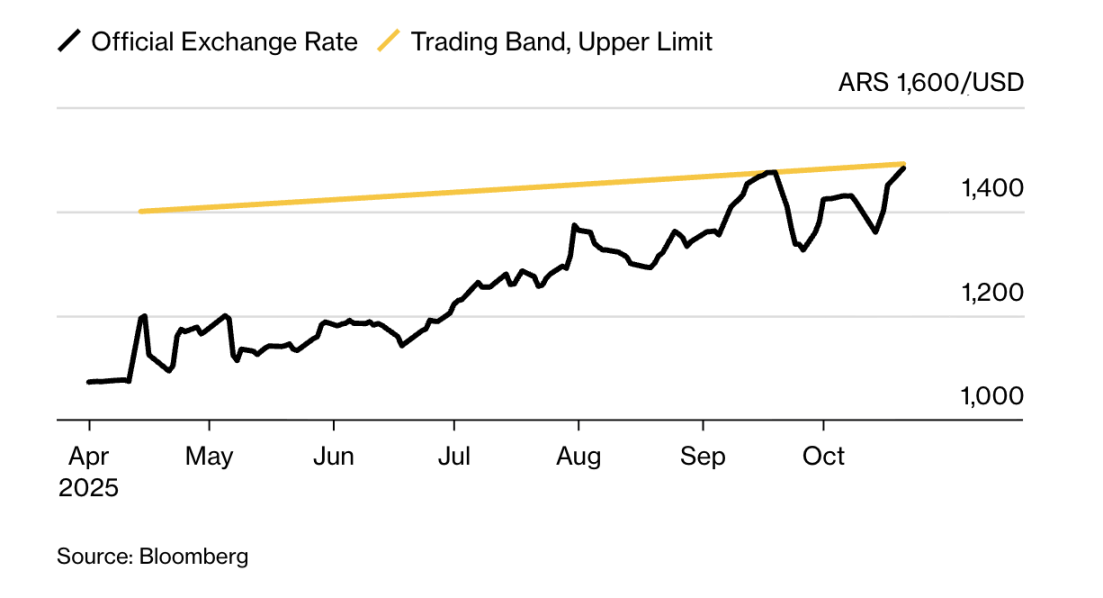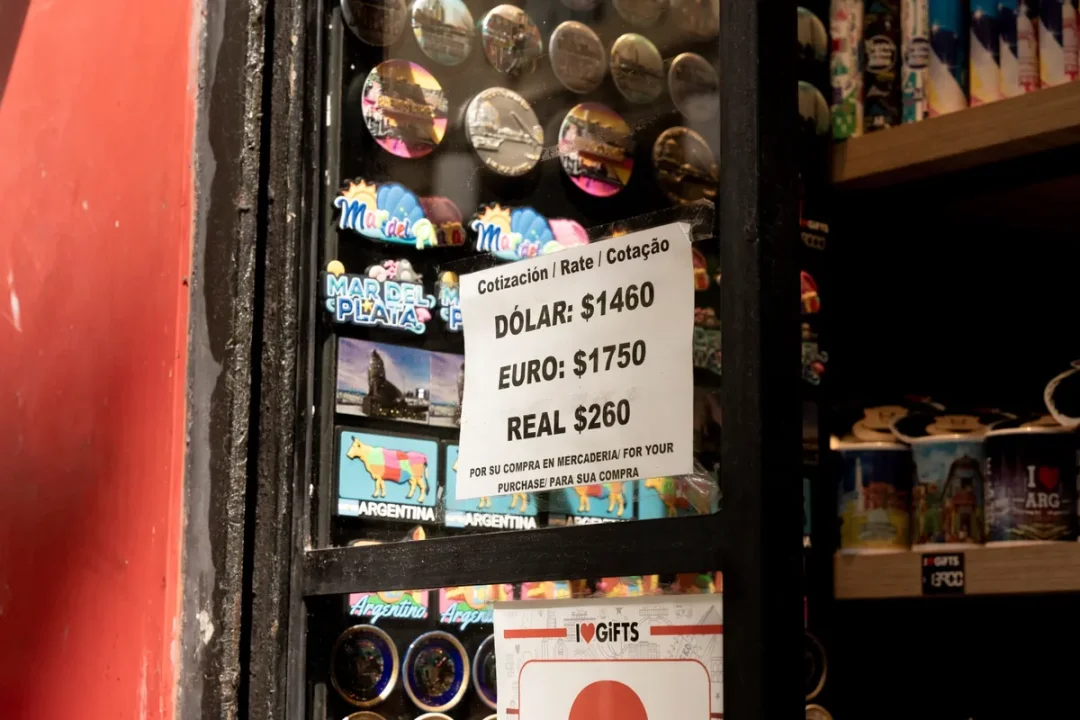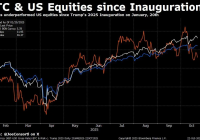The peso crisis escalates, stablecoins become a "lifeline" for Argentinians
The role of cryptocurrencies in Argentina has fundamentally changed: from a novelty that once sparked curiosity and experimentation among the public, including Milei himself, to a financial tool used by citizens to protect their savings.
The role of cryptocurrency in Argentina has undergone a qualitative change: from a novelty that once sparked curiosity and experimentation among the public—including Milei himself—to a financial tool for protecting personal savings.
Written by: Maria Clara Cobo
Translated by: Luffy, Foresight News

Bitcoin symbol outside a cryptocurrency exchange in Buenos Aires
As the midterm elections approach, Argentine President Javier Milei has tightened foreign exchange controls to support the peso, while citizens like Ruben López are turning to cryptocurrency to protect their savings.
A new strategy has emerged: using stablecoins pegged 1:1 to the US dollar to exploit the difference between Argentina's official exchange rate and the parallel market rate. Currently, the peso's value under the official rate is about 7% higher than in the parallel market. According to crypto brokers, the process works as follows: first, buy US dollars and immediately convert them into stablecoins; then exchange the stablecoins for pesos at the cheaper parallel market rate. This arbitrage operation, known as "rulo," can quickly yield up to 4% profit per transaction.

Milei at a campaign rally in Buenos Aires on October 17
"I do this trade every day," said López, a stockbroker in Buenos Aires, who uses cryptocurrency to hedge against inflation.
This type of crypto operation reflects a shift in how Argentinians are coping with a new wave of economic turmoil. Ahead of the October 26 election, Argentina is depleting its dollar reserves to boost the peso and prevent the exchange rate from breaching its trading band. Even with substantial support from the US, investors still expect the peso to depreciate further after the election.
Recently, the Central Bank of Argentina introduced new regulations prohibiting citizens from reselling US dollars within 90 days to curb rapid arbitrage trading. The "rulo" arbitrage model emerged almost immediately. On October 9, trading platform Ripio reported that "the trading volume of stablecoins against the peso surged 40% in a single week," attributing it to "users profiting from exchange rate fluctuations and market opportunities."
For some Argentinians, such operations are a necessity. After all, the country has defaulted on its debt three times this century. When Milei was elected in 2023, he promised to end these financial woes. He has achieved some results, such as reducing the annual inflation rate from nearly 300% to about 30%. However, the peso has still depreciated significantly, partly due to Milei's currency devaluation policy upon taking office and partly because of growing investor concerns ahead of the election.

Peso exchange rate approaching the upper limit of the trading band
The "rulo" arbitrage phenomenon demonstrates that the role of cryptocurrency in Argentina has fundamentally changed: from a novelty that once piqued the curiosity of the public—including Milei himself—to a financial tool for safeguarding savings. In the US, cryptocurrency is often used as a speculative instrument; but in Latin America, it has become a choice for those seeking stability. In countries like Argentina, Venezuela, and Bolivia, crypto technology helps people circumvent the triple pressures of "currency volatility, high inflation, and strict foreign exchange controls."
"We provide users with channels to buy cryptocurrency with pesos or dollars and then sell for profit—this is our daily business," said Manuel Beaudroit, CEO of local crypto exchange Belo. "Obviously, the exchange rate difference can bring considerable profits." He mentioned that in recent weeks, traders could earn 3%-4% per transaction, but also cautioned that "this level of return is very rare."
Cryptocurrency exchange services outside a shop in La Paz, Bolivia
Other exchanges have seen similar situations. Another local platform, Lemon Cash, reported that on October 1, the day the Central Bank of Argentina's 90-day ban on dollar resales took effect, its total crypto trading volume (including buying, selling, and exchanging) surged 50% above average levels.
"Stablecoins are undoubtedly a tool for obtaining cheaper US dollars," said Julián Colombo, head of Argentina at another trading platform, Bitso. "Cryptocurrency is still in a regulatory gray area, and the government has yet to clarify how to regulate stablecoins or restrict their liquidity, which has created conditions for the rise of 'rulo' arbitrage."
However, the growth in stablecoin trading is not solely due to arbitrage. As the Milei administration faces a critical election and renewed economic pressure, many Argentinians are also using cryptocurrency as a hedge against the potential further depreciation of the peso.
"Inflation and political uncertainty have made us more conservative, so I don't keep any savings or investments in pesos—I only use pesos for daily expenses," said Nicole Connor, head of the "Women in Crypto Alliance" in Argentina. "All my savings are in cryptocurrency and stablecoins, and I try to earn returns through them."

Exchange rate sign inside a store in Buenos Aires
Nevertheless, crypto operations are not without risk. In Argentina, stock market transactions are tax-free, but profits from crypto trading are subject to taxes of up to 15%. In addition, frequent trading may attract scrutiny from banks, which often require proof of funds from users making repeated large transfers.
But analysts believe that as economic difficulties persist, Argentina's reliance on stablecoins may deepen. Across Latin America, more and more people are using such tools to protect their assets against fiscal turmoil and election shocks.
"Stablecoins will always be around," said stockbroker López. "The US dollar plays an important role in Argentine society and daily life because it is our safe haven against local currency risk."
Disclaimer: The content of this article solely reflects the author's opinion and does not represent the platform in any capacity. This article is not intended to serve as a reference for making investment decisions.
You may also like
Ethereum Sets Glamsterdam Deadline and Fusaka Mainnet Date
![[October 11 Insider Whale] Twelve consecutive wins harvest 12.6 million, profiting from both long and short positions and leading market followers](https://img.bgstatic.com/multiLang/image/social/41e5d1ea953744c460d0cf212fd2c61b1761294785118.png)

When veterans sell and miners exit: Bitcoin supply and demand enter a period of conflict

